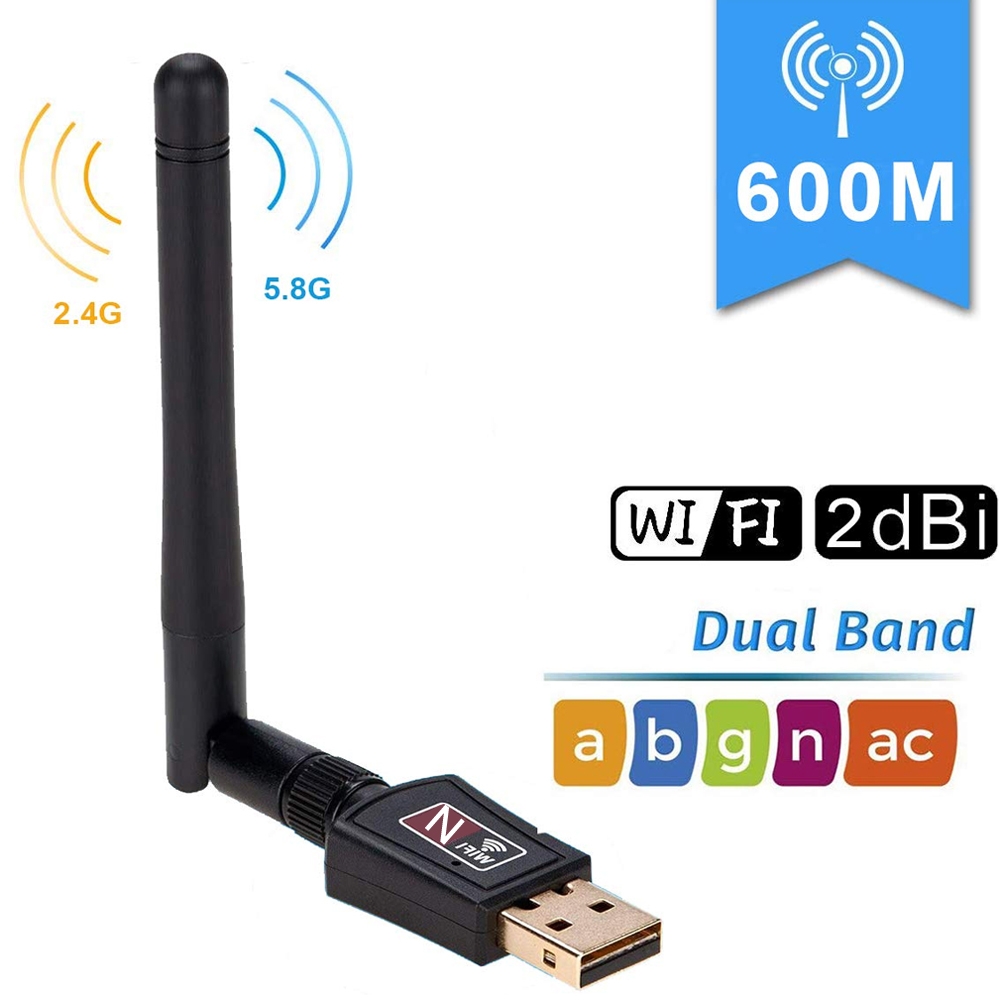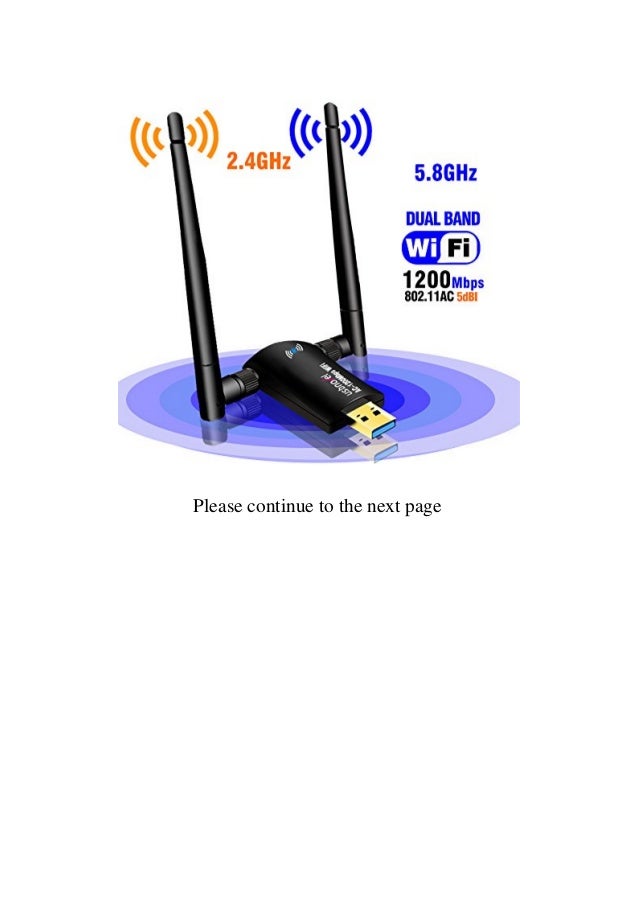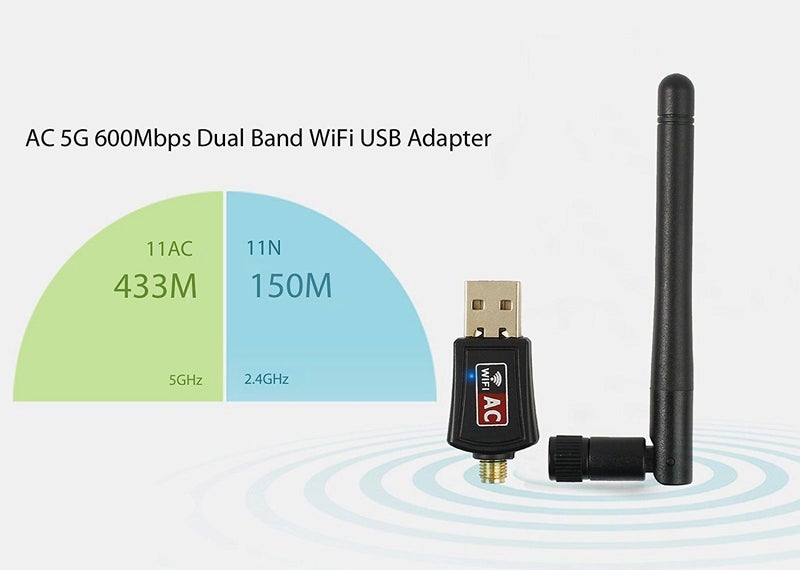- 5.After MAC is rebooted, please click the Wi-Fi icon to “Open Wireless Utility”, then you can choose your Wi-Fi and connect it. (Note: it may take time for utility to search W i-Fi, please wait patiently for about 1 min.) Now please enjoy your W i-Fi.
- Our 802.11n Wi-Fi USB adapter for Apple Mac is a wireless mini wireless USB adapter specially developed for Mac OS. It is compatible with: OS 10.4 Tiger OS 10.5 Leopard OS 10.6 Snow Leopard OS 10.7 Lion OS 10.8 Mountain Lion OS 10.9 Mavericks OS 10.10 Yosemite OS 10.11 El Capitan OS 10.12 Sierra OS 10.13 High Sierra OS 10.14 Mojave.

Older Macs may not have a slot for Apple’s AirPort Card, and even if yours does, you may want higher throughput than 802.11b WiFi offers – 802.11g will give you nearly five times as much bandwidth.
These WiFi adapters may well cost less than an AirPort Card, which tends to sell in the US$50-100 range nowadays.
Flenco Wifi Dongle AC 600Mbps Dual Band (2.4 GHz 150Mbps, 5GHz 433Mbps) High Speed Wireless USB Wifi Adapter With Antenna for PC / Desktop / Laptop / Tablet, Supports Windows 10/8/7/Vista/XP/2000, Mac Os X 10.4-10.11. Free Devicescape Software Mac OS X 10.4 Intel/PPC, Mac OS X 10.5 Intel/PPC/.6 Intel, Mac OS X 10.6/Intel Version 3.0.143 Full Specs Average User Rating: 2 User Votes. The Ralink USB Driver software package is designed to help you use the Ralink wireless devices with your Mac computer. The software creates a communication path between the operating system and the device, so you should be able to take full advantage of its capabilities.

This page covers USB, ethernet, PCI, and other WiFi hardware that is compatible with the Classic Mac OS. A few of these devices are compatible with Mac OS 8.6; all of them are reported to work with Mac OS 9, and most also have drivers available for some versions of Mac OS X.
PCMCIA/PC Card WiFi adapters compatible with Mac notebooks are covered in WiFi PC Cards for PowerBooks Running Mac OS 9.
This information is adapted from Mac OS Wireless Adapter Compatibility List by permission of the author, who gives a “nod to the linux-wlan.org Adapter List for doing the heavy lifting.”

Usb Wifi Mac Os X
| Vendor | Type | Product ID | Interface | Chipset | OS Support | Driver(s) | Comments | |||||
A | ||||||||||||
| Ambicom | 802.11b | WL1100BCF | Comp. Flash | Prism2/2.5/3 | 9, 10.2-10.4 | IOxperts | ||||||
| Ambicom | 802.11b | WL1100CCF | Comp. Flash | Prism2/2.5/3 | 9, 10.2-10.4 | IOxperts | ||||||
| Asante | 802.11b | AL2001 | USB | Amtel | 9, 10.2-10.4 | Belkin | Belkin drv With Asante VID | |||||
B | ||||||||||||
| Belkin | 802.11b | F5D6050 | USB | Amtel | 9, 10.2-10.4 | Belkin | ||||||
| Buffalo | 802.11b | WLICFS11G | Comp. Flash | Prism2/2.5/3 | 9, 10.2-10.4 | IOxperts | ||||||
| Buffalo | 802.11b | WLIPCML11G | USB (?) | Orinoco | 9, 10.2-10.4 | Ioxperts (10.2 and up), Macsense | ||||||
C | ||||||||||||
| Cisco | 802.11b | AIRPCI340 | PCI | Aironet (?) | 8.6-up | Cisco | ||||||
D | ||||||||||||
| D-link | 802.11b/g | DWL-G810 | Ethernet | 9, 10.2-10.4 | N/A | |||||||
E | ||||||||||||
F | ||||||||||||
| Farallon (see Proxim) | ||||||||||||
L | ||||||||||||
| Linksys | 802.11b | WET11 | Ethernet | Prism2/2.5/3 | Any | N/A | ||||||
M | ||||||||||||
| Macsense | 802.11b | WUA-400 | USB | Prism2/2.5/3 | 9-up | Macsense | ||||||
| Macsense | 802.11b | WUA-700 | USB | Prism2/2.5/3 | 9-up | Macsense | ||||||
| MacWireless | 802.11g | ? | Ethernet | ? | Any | None | ||||||
| Melco (see Buffalo) | ||||||||||||
N | ||||||||||||
| Netgear | 802.11b | MA101 | USB | Amtel | 9, 10.2-10.4 | Belkin | Belkin drv. w/Netgear VID | |||||
| Netgear | 802.11g | WGE111 | Ethernet | 9, 10.2-10.4 | N/A | |||||||
P | ||||||||||||
| Proxim | 802.11b | PN474(Skyline USB) | USB | Amtel | 9 | Proxim | Belkin OS X drivers? | |||||
Z | ||||||||||||
| Z-Com | 802.11b | XI300 | PCMCIA | Prism2/2.5/3 | 9, 10.2-10.4 | IOxperts, Macsense | ||||||
| Zyxel | 802.11g | G-405 | Ethernet | Unknown | 9, 10.2-10.4 | None | ||||||
Short link: http://goo.gl/WxIoBD
searchword: os9wifi
These advanced steps are primarily for system administrators and others who are familiar with the command line. You don't need a bootable installer to upgrade macOS or reinstall macOS, but it can be useful when you want to install on multiple computers without downloading the installer each time.
Download macOS
Find the appropriate download link in the upgrade instructions for each macOS version:
macOS Catalina, macOS Mojave, ormacOS High Sierra
Installers for each of these macOS versions download directly to your Applications folder as an app named Install macOS Catalina, Install macOS Mojave, or Install macOS High Sierra. If the installer opens after downloading, quit it without continuing installation. Important: To get the correct installer, download from a Mac that is using macOS Sierra 10.12.5 or later, or El Capitan 10.11.6. Enterprise administrators, please download from Apple, not a locally hosted software-update server.
OS X El Capitan
El Capitan downloads as a disk image. On a Mac that is compatible with El Capitan, open the disk image and run the installer within, named InstallMacOSX.pkg. It installs an app named Install OS X El Capitan into your Applications folder. You will create the bootable installer from this app, not from the disk image or .pkg installer.
Use the 'createinstallmedia' command in Terminal
- Connect the USB flash drive or other volume that you're using for the bootable installer. Make sure that it has at least 12GB of available storage and is formatted as Mac OS Extended.
- Open Terminal, which is in the Utilities folder of your Applications folder.
- Type or paste one of the following commands in Terminal. These assume that the installer is still in your Applications folder, and MyVolume is the name of the USB flash drive or other volume you're using. If it has a different name, replace
MyVolumein these commands with the name of your volume.
Catalina:*
Mojave:*
High Sierra:*
El Capitan: - Press Return after typing the command.
- When prompted, type your administrator password and press Return again. Terminal doesn't show any characters as you type your password.
- When prompted, type
Yto confirm that you want to erase the volume, then press Return. Terminal shows the progress as the bootable installer is created. - When Terminal says that it's done, the volume will have the same name as the installer you downloaded, such as Install macOS Catalina. You can now quit Terminal and eject the volume.
* If your Mac is using macOS Sierra or earlier, include the --applicationpath argument, similar to the way this argument is used in the command for El Capitan.
Use the bootable installer
After creating the bootable installer, follow these steps to use it:
- Plug the bootable installer into a compatible Mac.
- Use Startup Manager or Startup Disk preferences to select the bootable installer as the startup disk, then start up from it. Your Mac will start up to macOS Recovery.
Learn about selecting a startup disk, including what to do if your Mac doesn't start up from it. - Choose your language, if prompted.
- A bootable installer doesn't download macOS from the Internet, but it does require the Internet to get information specific to your Mac model, such as firmware updates. If you need to connect to a Wi-Fi network, use the Wi-Fi menu in the menu bar.
- Select Install macOS (or Install OS X) from the Utilities window, then click Continue and follow the onscreen instructions.


Learn more
For more information about the createinstallmedia command and the arguments that you can use with it, make sure that the macOS installer is in your Applications folder, then enter this path in Terminal:
Catalina:
Mojave:
High Sierra:
Usb Wifi For Mac Os X
El Capitan:
